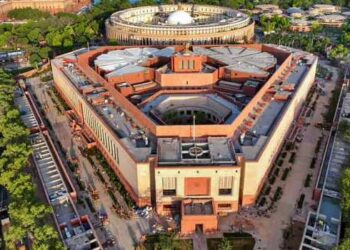New Delhi: The Finance and Corporate Affairs Minister Smt Nirmala Sitharaman, while presenting the Interim Union Budget for 2024-2025 in Parliament today announced that the capital expenditure outlay for the next year is being increased by 11.1 per cent to Rs 11,11,111 crore, which would be 3.4 per cent of the GDP.
As per the IMF, India is likely to become the third-largest economy in 2027 (in USD at market exchange rate) and it is also estimated that India’s contribution to global growth will rise by 200 basis points in 5 years.
Moreover, various international agencies such as the World Bank, the IMF, OECD and ADB project India to grow between 6.4 per cent, 6.3 per cent, 6.1 per cent and 6.7 per cent, respectively in 2024-25.
In a major announcement, the Finance Minister said, the scheme of a fifty-year interest-free loan for capital expenditure to states will be continued this year with a total outlay of Rs1.3 lakh crore. A provision of seventy-five thousand crore rupees as a fifty-year interest-free loan is proposed this year to support the milestone-linked reforms of Viksit Bharat by the State Governments.
Pointing out some of the bright spots of the economy, the Finance Minister informed that the Revised Estimate of the total receipts other than borrowings is Rs 27.56 lakh crore, of which the tax receipts are Rs 23.24 lakh crore. The Revised Estimate of the total expenditure is Rs 44.90 lakh crore. The revenue receipts at Rs 30.03 lakh crore are expected to be higher than the Budget Estimate, reflecting strong growth momentum and formalization in the economy.
Smt Nirmala Sithraman said, Prime Minister Shri Narendra Modi firmly believes and focused on four major castes. They are, ‘Garib’ (Poor), ‘Mahilayen’ (Women), ‘Yuva’ (Youth) and ‘Annadata’(Farmer). She said, their needs, their aspirations, and their welfare are the government’s highest priority because the country progresses when they progress.
Smt Nirmala Sitharaman elaborated that this government’s humane and inclusive approach to development is a marked and deliberate departure from the earlier approach of ‘provisioning up-to-village level’. Development programmes, in the last ten years, have targeted every household and individual, through ‘housing for all’, ‘hargharjal’, electricity for all, cooking gas for all, bank accounts and financial services for all, in record time, she added.
The Finance Minister stressed that this Government is working with an approach to development that is all-round, all-pervasive and all-inclusive. It covers all castes and people at all levels. She said, “We are working to make India a ‘Viksit Bharat’ by 2047. For achieving that goal, we need to improve people’s capability and empower them”.
Making a slew of announcements, Smt Nirmala Sitharaman said, the Government will pay utmost attention to making the eastern region and its people a powerful driver of India’s growth, PM Awas Yojana (Grameen) is close to achieving the target of three crore houses and two crore more houses will be taken up in the next five years to meet the requirement arising from increase in the number of families. Similarly, through rooftop solarization, one crore households will be enabled to obtain up to 300 units of free electricity every month.
No change relating to taxation has been proposed in the Interim Budget. The same rates for direct taxes and indirect taxes, including import duties, have been retained. However, to provide continuity in taxation, certain tax benefits to Start-Ups and investments made by sovereign wealth or pension funds as also tax exemptions on certain income of some IFC units have been extended by one year up to 31st March 2025.






